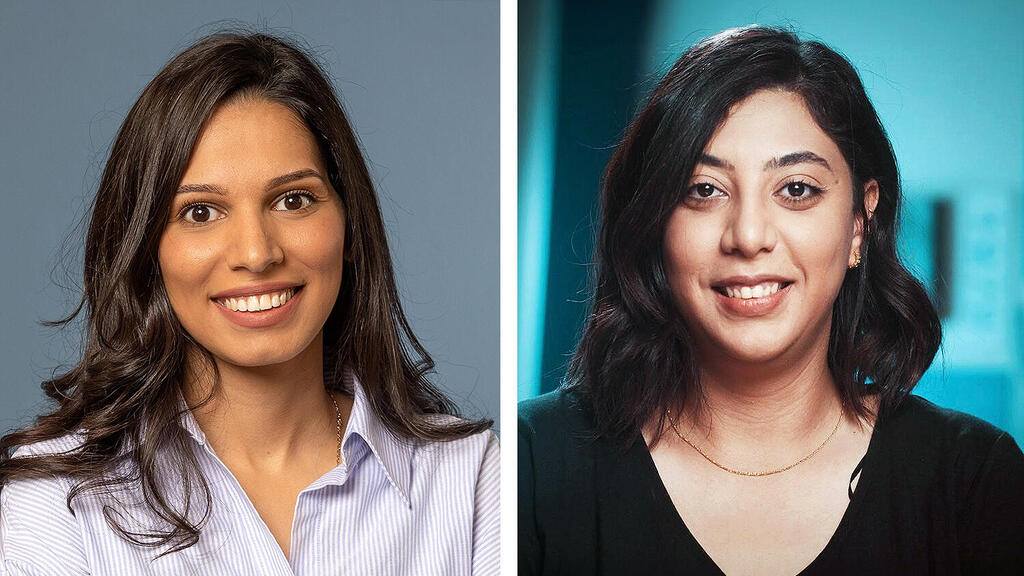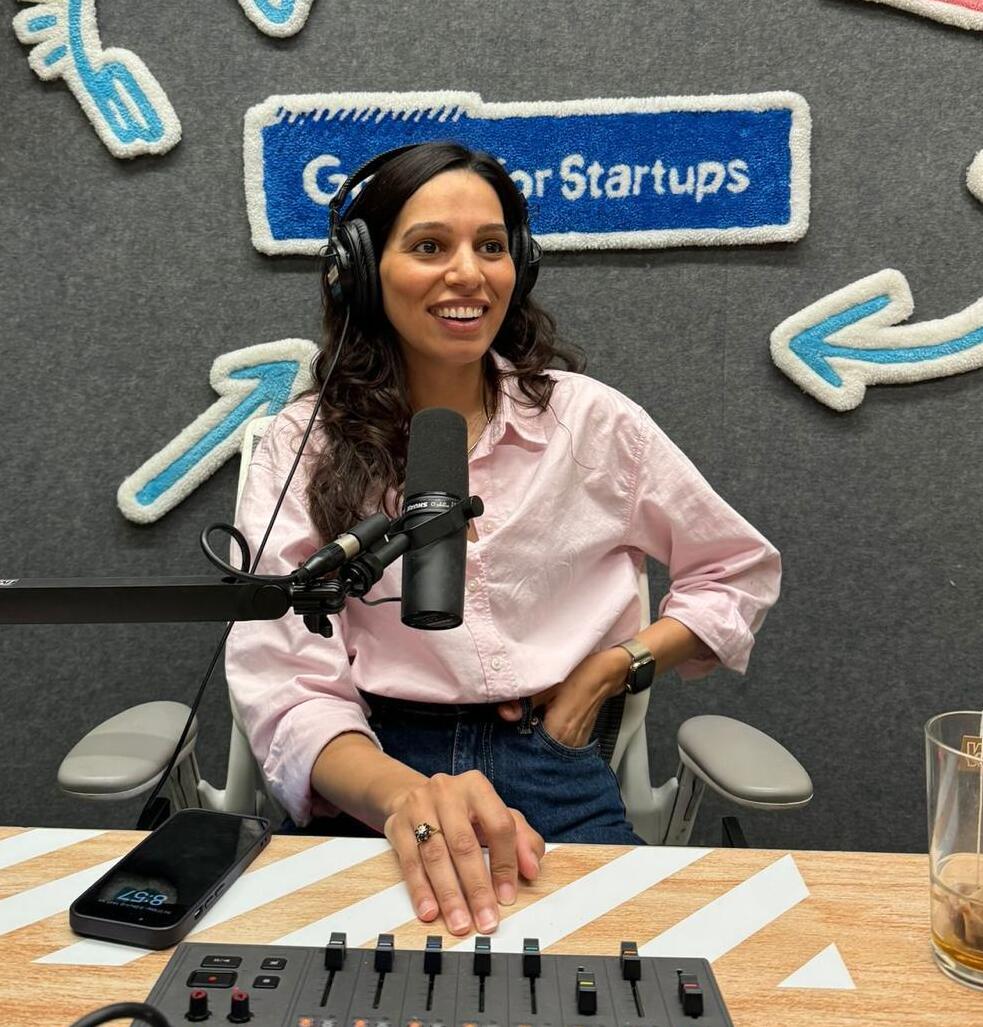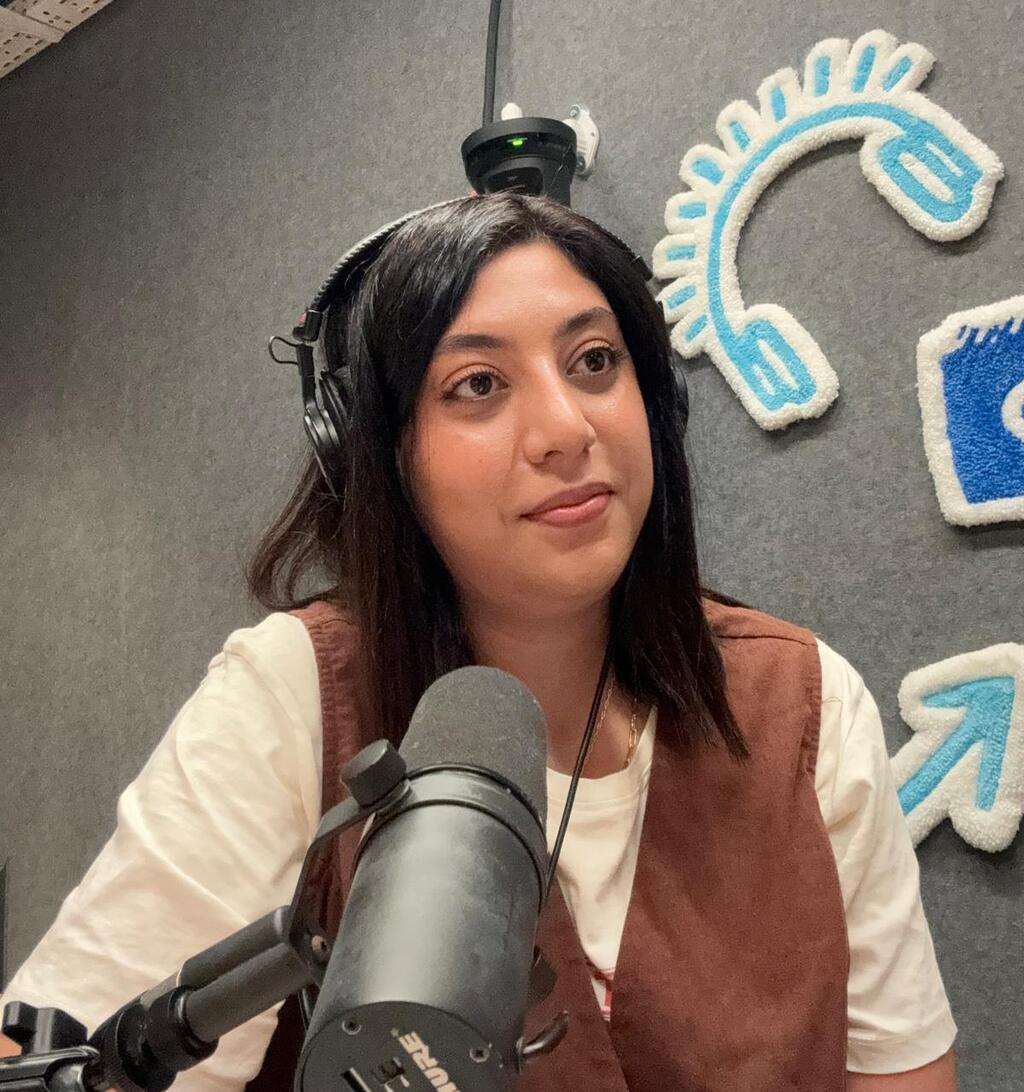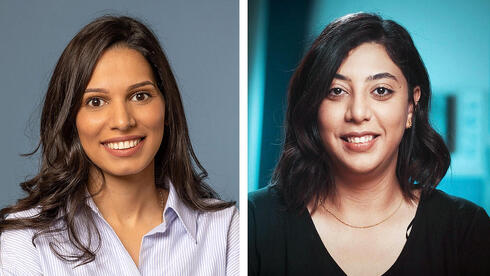
“We constantly need to prove that we’re ‘good Arabs;’ the tech industry should be better”
Khouloud Ayuti and Saja Kabaha spoke to CTech about Seeratech - the first women-led Arabic podcast about Arab tech leaders in Israel which they co-host. They discussed the importance of amplifying voices from their community in the industry and navigating unique challenges as Arabs in tech amid the ongoing war.
At the Google for Startups campus in the heart of Tel Aviv, Saja Kabaha and Khouloud Ayuti meet every week to record Seeratech - the world’s first female-led tech podcast in Arabic. Seeratech features interviews conducted by the two hosts with tech leaders from Israel’s Arab community. “Our first guest was a VP at IBM. We’ve interviewed senior executives from global corporations, startup founders, community leaders, and consultants from all over the country,” says Ayuti.
Meaning ‘your (feminine) story’ in Arabic, Seeratech was born out of Ayuti and Kabaha's shared desire to highlight success stories from Israel’s Arab community in tech and build a bridge for Arabs in the industry. “We wanted to build a community and a resource where people could share their stories so that others would have the roadmap that we didn’t,” says Kabaha.
A program manager at the UK Embassy's Tech Hub, where she focuses on fostering Israeli-UK partnerships as well as supporting the Arab tech community, Kabaha previously worked as a project manager at Intel for three years. “My journey to tech was completely random. My big dream was the U.N., but I fell in love with the tech world partly because of the status it held but also because I understood how impactful it was. When I got to Intel I was the only Arab woman. I was looking for someone to talk to about my experience and that’s when I met Khouloud.”
When she met Kabaha, Ayuti was the Co-CEO of PresenTense, a non-profit focused on promoting entrepreneurship among underrepresented communities. Today she is the director of the philanthropic foundation Boustan which aims to reduce social gaps and promote shared societies in Israel and Palestine including in tech, employment and education. “There was - and still is - a huge information gap regarding tech in the Arab community, including miscommunication and not just linguistically, but culturally. Because Saja worked inside the industry and I was involved in initiatives outside of it, we had two different perspectives and together saw the bigger picture,” she says.
While there were many Hebrew-language podcasts about the tech industry, in addition to the language gap, both women highlighted that the typical route that most Israeli Jews take to gain entry to the tech industry was simply not relevant for much of the Arab community. “We’re both the first generations in our family to go to university. We didn’t serve in the army let alone in 8200 [the vaunted intelligence unit from which many tech employees start their careers]. How much could I relate to a Hebrew podcast led by 8200 graduates? How would that help me?” says Kabaha.
Related articles:
Even within the Arab world, there is nothing quite like Seeratech - a podcast focused on sharing the personal journeys of Arab high-tech workers, in Arabic, and led by two women.
“There were many tech-related podcasts in the Arab world, but they were in English and they weren’t being led by women. The only women-led podcasts that existed were lifestyle or motherhood focused. And most of the tech podcasts were highly technical, focusing on tech products, not on the industry or highlighting individual experiences,” says Ayuti.
Seeratech quickly distinguished itself in the podcast landscape and has garnered significant attention not just within Israel but across the Arab world. In July 2021, Seeratech was rated the 7th most popular Arabic podcast and among the top knowledge podcasts in Israel, competing with Hebrew-speaking podcasts. The hosts meticulously research and write all of the content for their episodes, of which they have produced twenty and interviewed thirty handpicked guests.
Barriers for Arab employees
One of the main points of discussion on the podcast are the unique challenges faced by Israel’s Arab community in gaining entry to the tech industry, where, despite making up 20% of the population, Arabs account for only 2% of all tech workers. “Often our guests are the only Arabs at their companies and it can be very lonely - it’s one of the things that ties them all together,” says Kabaha. “People have to build their own networks and connections. It’s something that you can learn but it’s difficult to do.”
The lack of Arab representation in tech is due to a number of factors, the hosts say. The classic path to high-tech which typically goes through army intelligence units is one that the vast majority of Arabs don’t participate in. Knowledge of Hebrew and integration in Israeli society is another. The lack of Arab representation in tech is what makes the industry feel less realistic and attainable. “Exposure is critical; I had no idea what high-tech was until I was 24 and I was only exposed to it because of social media,” adds Kabaha.
While high-tech has long surpassed other professions in status in greater Israeli society, it took much longer to reach Israel's Arab community, where professions like medicine and law are still considered the most sought-after positions. “Most people see fields like education, medicine or law as safer, and these are all industries where there are more role models and representation,” says Ayuti. However, the two say that this status has started to shift, noting that Arab students are increasingly choosing to study in tech-related fields like programming or engineering.
In addition to these unique challenges, there is also the ongoing economic slowdown that the tech industry has been experiencing in Israel for over a year. This has particularly impacted junior or entry-level positions, for which the supply is vastly exceeded by the demand, an issue, Kabaha and Ayuti note, which disproportionately impacts the Arab tech community who are mainly junior or entry-level employees.
“This slowdown has impacted faith in the industry. Parents don’t want to send their kids to study something that they don’t even understand, that they view as potentially unstable. It creates a vicious circle,” says Kabaha.
Programmers, not diplomats
“There has been a lot of investment in integrating the Arab community into the economy, and especially tech, because everyone understands that the Arab population is key to economic prosperity,” says Ayuti. However, she says that, “even if they get the education, it’s so hard for them to get their foot in the door in the industry. There’s a lack of people who believe in you, to actually open the door for you.”
In recent years, there has been a notable increase in the economic integration and number of Arab students pursuing tech-related fields in academia, such as the Technion where Arab students make up 25% of the student population. However, the outbreak of the war has created a new reality, challenging the integration efforts and initiatives established over the past two decades.
4 View gallery
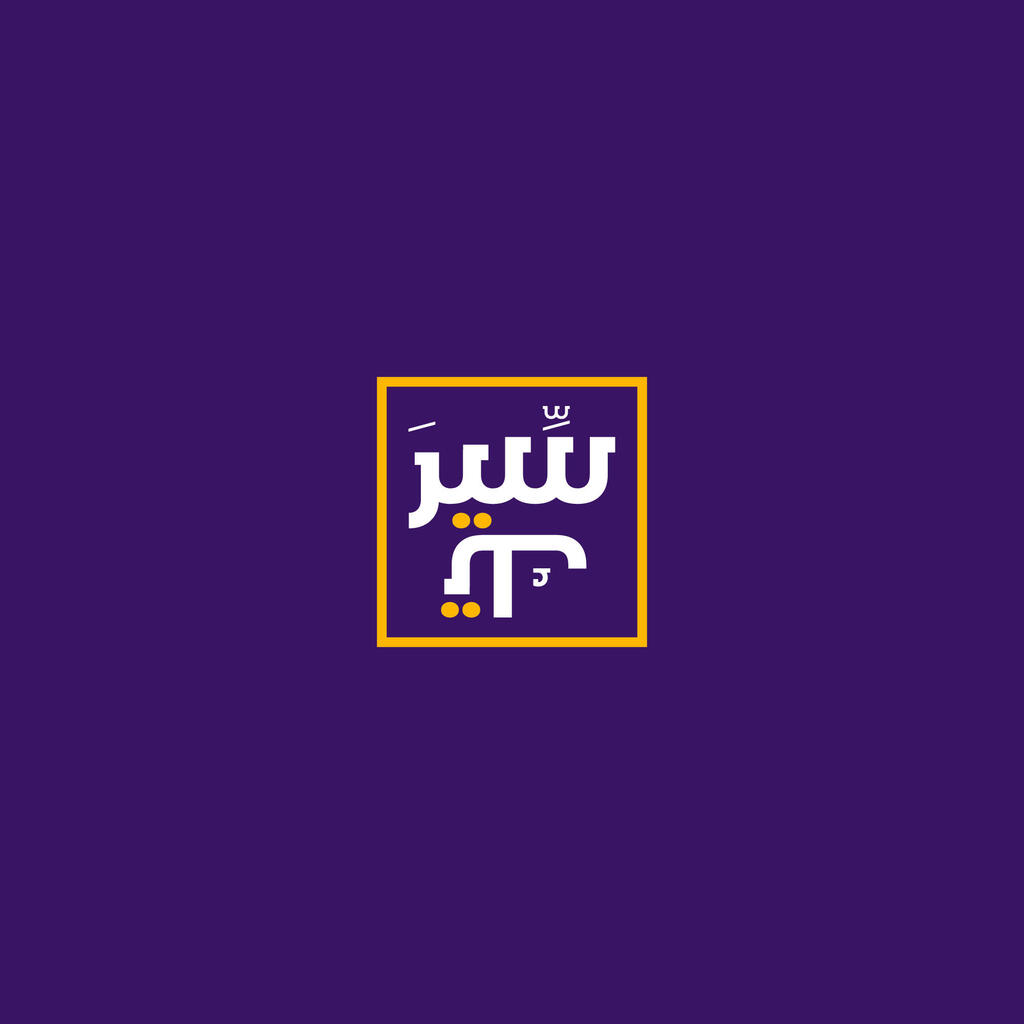

The Seeratech logo in Arabic. Seeratech means 'your (feminine) story.'
(Credit: Seeratech)
The hosts say that there has been an increase in anti-Arab discrimination across various industries including tech. “Our guests never said explicitly that they weren’t hired because of racism - it's not always explicit, especially in tech - but we can read between the lines. And it’s not a new thing, but now people feel very unsafe. Suddenly, you're no longer a talented programmer or a team leader - you’re an Arab and a representative of all Arabs,” says Ayuti.
“Our guests didn’t study diplomacy or Middle Eastern history, they want to talk about programming or engineering. They don’t want to be reduced to their identity. But, in the end, despite all of the discourse around inclusiveness and diversity, we are often still considered the enemy, and we constantly need to prove that we are ‘good Arabs.’ The tech industry can and should be better.”
At the same time, both Ayuti and Kabaha feel that the tech industry is unique in its potential for collaboration. “Right now, this is one of the few industries with Arab and Jewish employees working together, with a shared language which is coding and innovation, and this doesn’t happen in other sectors,” says Kabaha, pointing to the positive role that the tech industry played in the immediate aftermath of October 7. “One of the most inspiring things that happened after October 7 was that civil society said ‘we aren’t waiting for the government,’ and tech was a big part of this. Now the industry needs to be rebuilt in the same way. There needs to be a safe industry for coming together for innovation.”
During this period of intense sadness and uncertainty, both hosts questioned whether to continue with the podcast. “At some point we thought about whether we should continue because we were so psychologically affected by the situation. Everything feels small by comparison, not just what’s going on around us in the greater world, but the impact it has in our own communities. We would record a podcast and then we’d hear a horrible story about someone being killed and at some point we thought we should stop,” says Ayuti.
But meeting their guests and recording the episodes raises their spirits. “Even when we feel depressed by the state of affairs, we all immediately feel happy as soon as we start talking. We realized what a safe haven the podcast had become both for us, as well as for the guests. It’s constructive escapism.”
Beyond that, they feel a sense of obligation to highlight positive stories from their community especially during this period. “As a successful Arab in tech or anywhere else, you have a responsibility not just to yourself but to your community. You don’t get to gatekeep the secrets of your success from other people; if you made it to Google, you’re going to help ten other Arabs to Google,” says Kabaha.
They hosts say that they feel personally inspired by the guests who come onto the podcast. “We are so proud that we can be a platform for these people to share their success stories. It's an honor. You only hear negative things about our community in the media so it's a privilege to platform positive voices,” says Ayuti.









